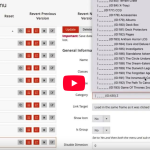
October 7,2021
Communicating on Social Media. Part 1: The strategy
![]()

I love Facebook for chatting with friends and family. I dislike twitter (but joined because I felt I should learn). I am an intermittent user of Linkedin – or at least I have a profile. I have no idea about Tumblr, Pinterest or Instagram – nor any interest in using them.
So, the question is, how would a business communicate with me on social media? Well, if they knew anything about me, I’d say “Forget it – I don’t want you to communicate with me on social media, I would prefer a number of other ways for you to get in touch”. But that’s just me, I prefer to use social media for socialising, not interacting with businesses. Having said that, some people actually do like to engage in social media with businesses and vice versa and clever businesses could interact with me on social media without using the typical “sales” approach which could result in me interacting with them without realising it – if done properly.
The common mistake by some businesses is that they think social media is fast, cheap and easy. Open a facebook or twitter page (or both) and “Lets go!” In reality it’s the opposite – if you’re going to do it right. This blog and the following one will explore the topic of communicating using social media and what businesses probably need to consider when entering into that world.
The approach to the overall strategy:
Social Media strategy comes in 4 parts:
- Research
- Setting the goals
- Involvement
- Measurement and adapt
Research
It’s important to know WHERE your customers are. Even if they are on social media (which they might not be), it doesn’t mean they’re all using the same one, or they’re using them in the same way. Research is KEY to your social media strategy and it takes time. Listening to conversations on social media is a good way to understand your customers and where they are – and what they’re saying. Companies should spend time researching when looking at social media as a communication channel. Spend time learning about your audience – their likes, dislikes, “unwritten rules” of the channels and communities, find out who are the key influencers (positive and negative), what content engages most with people – what do they respond to. Doing this for all the different social media takes a long time and can be resource intensive – but it’s vital to understand. Jumping in with both feet saying “Here we are, we want to sell something to you” is an instant way to put people off – and potentially cause irreversible damage to your brand.
People don’t go on social media to be marketed to – in most part, they’re happy to share, but doing it in the right way is vital. Social media is their space, not yours. It’s vital you understand their drivers or you’ll get nowhere and it’ll be the biggest waste of your resources.
Great, the research is done, you know who, where and what. Now what!?
Define Your Goals
If your business is new to social media, setting targets or goals might be difficult initially, but one thing to consider is you should still make them – even if it is a bit of an educated guess (from your vast research, you should have some idea what to expect!). The main thing to consider is whether you reach your goals or not, you will (or should) at least LEARN something. One way you can measure social media is to measure engagement or “return on conversation” – not return on investment. Consider return on conversation in your goal-setting.
In order to decide the appropriate goals, consider why you’re carrying out a social media engagement and go from there. Learn and adapt those goals as necessary. It doesn’t mean you’ve failed if you’ve not met those goals, simply adjust as you learn – and don’t give up! It’s a constantly evolving channel.
Involvement
Involving everyone in the business is essential. Some need higher levels of involvement than others, but it’s important everyone know what’s going on if nothing else.
Deciding who’s “in charge” of social media is a tricky one. Should it be the PR team who generate stories? Should it be the marketing team or the sales team on the ground? The answer is that it should be whomever your research deems the best person / people and it might actually be a combination of all of those – and others.
Customer services or technical teams can be involved with some “FAQ’s” perhaps, or the management team might like to increase their influence by getting involved – particularly in certain topics / circumstances. I would suggest the office intern or the most junior person isn’t the right person though. Social media is a tricky route to navigate, giving the responsibility to someone who’s only just in the door or who doesn’t really understand the business could end in disaster.
The main point is to communicate internally and engage the entire business before you start – share the purpose, the plans, ask for input and feedback. Engage internally before engaging externally, it will prove beneficial and you will most likely learn something from others within the business to help with the plans.
Measure and Adapt
Measuring is essential to social media. Because we’ve just shown it’s not cheap, quick or easy, it’s important to know how it’s going – good or bad. Good so you can learn and do it even better, bad so you can learn and adjust. The key word is “learn” – if you don’t measure, how can you learn.
Measuring goals is a great start to determining how successful your social media plans are, but if you don’t reach your goals (or in fact overachieve) consider what you can learn and look at revising them, don’t give up! It’s not a failure if you can learn and make it better – and it’s always about quality, not quantity.
Whatever the goals, purpose, channels and content, you need to stay on top of things as they’re constantly evolving. Social media is not static and is always changing. Staying on top of the current and future trends should be a high priority. Who remembers (and still uses) Myspace or Bebo? I vaguely remember them, but Facebook and Twitter are now the more widely used social forums – and that was only within the last few years. Monitoring and listening to social media will keep you informed and as you measure your goals.
Most businesses will find that either now or in the future, they’ll enter the world of social media, the main consideration is to do it properly.
In the next blog, I’ll look at the audience, the channels and the content and will explore the tactics of communicating on social media.




